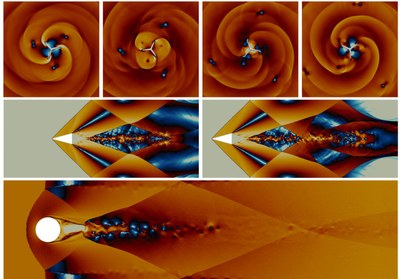Workshop “Multi-scale, Multi-physics, Coupled Problems and AI enhanced simulations on HPC (MMCP)”
HPC Asia 2025, February 19-21, Hsinchu, Taiwan

Links
Conference webpage: HPC Asia 2025 in Taiwan
Description
The objective of this workshop is to provide a forum for the presentation and discussion of advanced numerical simulation techniques for complex multi-scale, multi-physics, coupled problems and AI enhanced simulations on high-performance computing (HPC) systems.
Applications with different characteristics in parts of the computational domain can lead to unexpected performance issues. The optimum setting for one part might be contradictory to the optimum for another; the overall optimum might be non-optimal, but still a satisfactory compromise for researchers.
A variety of methodologies have been employed during the development of individual solutions, contingent upon the specific application and the underlying hardware configuration. In terms of the application, for example, machine learning algorithms have been introduced with a view to prediction purposes of simulation results. With regard to the hardware, the introduction of both homogeneous and heterogeneous cluster settings has been considered. All combinations have advantages and disadvantages, leading to the following question: how to find the optimal configuration and setting of all parameters, with respect to quality of solution vs. computational efficiency?
The objective is to optimize the performance and efficiency of each component (region or solver). However, the characteristics of other scales and other physical phenomena may necessitate a different approach. Furthermore, the use of machine learning/deep learning algorithms may present novel challenges in the context of parallel execution and load imbalances, or may even impede the overlapping of communication when employed for computational processes within e.g. coupled simulations.
The workshop will concentrate on the computational aspects of performance and suitability for high-performance computing. Moreover, the fundamental methodologies that facilitate the execution of extensive simulations will be highlighted.
Keeping these aims in mind, contributions from all aspects of engineering applications will be considered. Topics of applications will include (but are not be limited to):
- AI models for simulation prediction
- AI based parameter modelling
- Provenance of machine learning/deep learning algorithms on HPC systems
- Multi-scale problems
- Multi-physics problems
- Molecular Dynamics
- Multi-Domain/Concurrency
- Multi-scale and/or multi-physics modelling for biomedical or biological systems
- Novel approaches to combine different scales and physics models in one problem solution
- Challenging applications in industry and academia, e.g. turbulence and multiphase flows, fluid-structure interactions, chemical engineering, material science, biophysics, automotive and aerospace industry, …
- AI based load balancing modelling
- Load balancing
- Adaptivity
- Heterogeneous architectures
- New algorithms for parallel-distributed computing, specific to this topic.
Organizers/Chairs
Dr.-Ing. Neda Ebrahimi Pour
Prof. Dr.-Ing. Sabine Roller
Prof. Dr. Ryoji Takaki
Program Committee members
- Benjamin Uekermann, University of Stuttgart, SimTech – Cluster of Excellence, Germany
- Hiroyuki Takizawa, Tohoku University, Department of Mechanical Engineering, High Performance Computing, Japan
- Ryusuke Egawa, Tokyo Denki University, Department of Information and Communication Engineering, Japan
- Hartwig Anzt, University of Tennessee, Department of Electrical Engineering and Computer Science, USA
- Kazuhiko Komatsu, Tohoku University, Cyberscience Center, Japan
- Patrick Kopper, University of Stuttgart, Institute of Aerodynamics and Gas Dynamics (IAG), Germany
- Pascal Omnes, Atomic Energy and Alternative Energies Commission, France
- Josefine Umlauft, Earth and Environmental Sciences group at ScaDS.AI, Germany
Format and Submission Guidelines
All authors should submit manuscripts for review in a single-column format. Manuscripts must be at most 18 pages in PDF format including figures and references, formatted according to the ACM Proceedings Style. The ACM templates for Word and LaTeX are shown below. Also, ACM has partnered with Overleaf and the ACM LaTeX template on Overleaf platform is available. Please use the templates in “STEP 1” according to the following page: https://www.acm.org/publications/authors/submissions. Please note that there are two different instructions for Word and LaTeX template users. Papers are submitted for the review to EasyChair (“STEP 2”) using the following link: https://easychair.org/conferences/?conf=mmcp25
Please note that there are two different instructions for Word and LaTeX template users.
ACM Templates
Word (docx) download
LaTex (zip) download
use a “manuscript” format option (Please refer to sample/sample-manuscript.tex).
Overleaf use a “manuscript” format option.
LaTex (zip) download
use a “manuscript” format option (Please refer to sample/sample-manuscript.tex).
Overleaf use a “manuscript” format option.
Proceedings
The papers that have been accepted for MMCP’25 will be published as proceedings.
ACM has made a substantial change to their publication policies from 2024. Authors of articles from conferences published Open Access (OA) in the ACM Digital Library will have to pay for paper processing charge (APC).
However, if your institution is a member of the ACM Open program, the paper will be published with no charge, as indicated on the web site. The list of participating institutions of ACM Open can be viewed here.
Important dates
- Submission deadline: 22 December 2024 (extended)
- Notification of Acceptance: 12 January 2025
- Camera-ready paper: 15 January 2025
- Conference date: 19 – 21 February 2025
